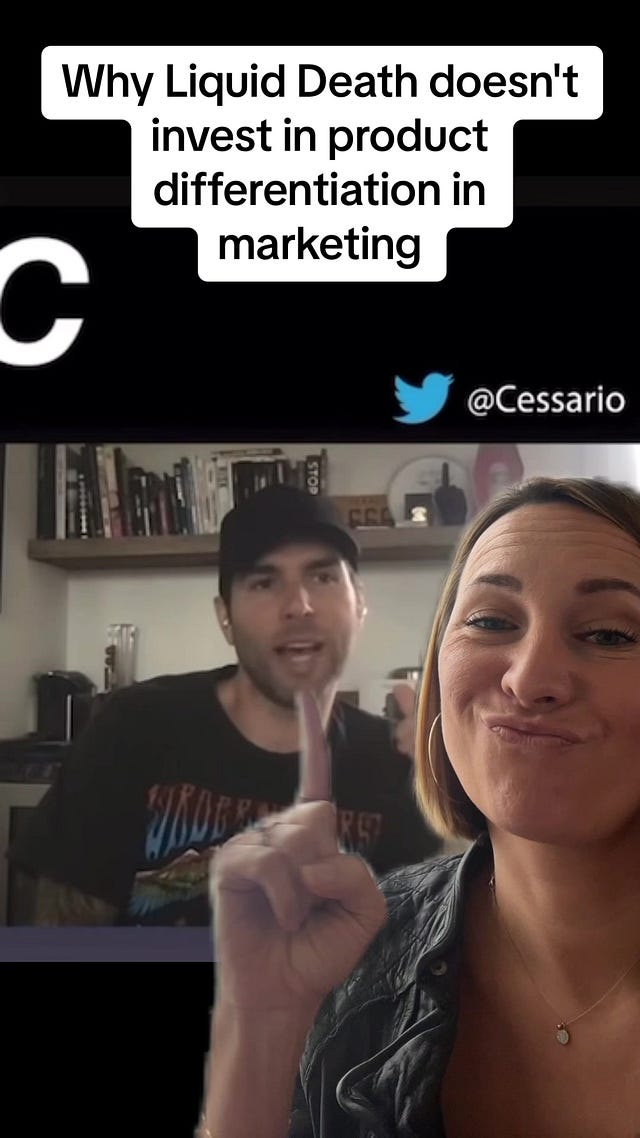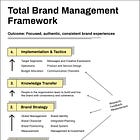520. Differentiation 🦩
The difference between product differentiation and brand differentiation ... and which one wins in the long-term
Hellooo 👋 So happy to have you here. I’m Kevan. I have spent 15+ years as a head of marketing for some cool tech startups. Now I’ve co-founded a brand storytelling business called Bonfire. We do coaching, advisory, and content. If you identify with creativity and marketing, we’d love for you to join us.
Product differentiation does not exist. But brand differentiation does.

Many who know me know that I love water. I can name you all the best water brands, all the most essential water features, all the water trends — yes, water trends exist!
Water is one of the most commoditized things on earth, and yet there are billion-dollar brands that sell water at a premium and drive incredible loyalty among their audiences. Liquid Death is one of the most notable ones because of how differently they’ve approached their brand, selling canned water with a snarky, over-the-top, heavy metal brand identity.
For Liquid Death, differentiation is not about the product itself. It’s about the brand.
Here’s how CEO Mike Cessario puts it:

 Tiktok failed to load.
Tiktok failed to load.Enable 3rd party cookies or use another browser
To truly stand out and to truly own something is hard.
Your brand might be differentiated because you have this ingredient in it and nobody has it. Yeah, that can be a differentiated thing for a few moments, but the minute you have any success, any other brand can put the same ingredient in there …
You can’t own an ingredient.
That’s why with Liquid Death we always focused on brand. Even though we’re water in a can, people were like, “Why don’t you guys talk about why aluminum is infinitely recyclable and ‘death to plastic.’ That’s what you should be talking about. Not the funny, heavy metal stuff.”
But we can’t own aluminum cans. So if I spend all my marketing dollars telling people “aluminum is infinitely recyclable,” and there’s four other canned water brands, I’m just telling people why my competitors are good.
This clip was part of an hourlong podcast episode that came out last year on 20VC with Harry Stebbings. It’s a good listen!
Liquid Death eschews product differentiation because you can’t own an ingredient.
All B2C companies should take note. All B2B companies should, too!
Software is no different. You cannot own a product feature. Successful features get copied, and if you base your differentiation on features and product lines, then—poof!—there goes your differentiation.
I was fortunate enough to have a front seat for how software brands can differentiate apart from product functionality. A product like Buffer has stayed relevant in the social media marketing category because of a super strong brand that supersedes any sort of product differentiation. Many marketers who are familiar with marketing technology probably cannot tell you the difference between Buffer and Sprout and Hootsuite and Later, but they might be able to tell you that they’ve heard of Buffer, they like Buffer, and they know Buffer to be doing some cool things in remote work, transparency, and values-driven company culture. In fact, when I was at Buffer, we had customers keeping their subscriptions with us simply because of the brand and long after their use case for social media management had ended. That’s the brand marketing dream!
The trouble with product differentiation
1 - Every successful product feature will be copied eventually
Functionality is never differentiated for long. Some software products boasted about their AI feature set for a few months but now seemingly every software product in the world has AI.
2 - Product differentiation is logical and brain-y
And we know that people make decisions with their brains and with their hearts. Product features tend to be more like must-have checklists to shortlist potential options; it’s the emotional brand connection, trust, and reputation that tends to win people over.
3 - Broad strokes matter more than tiny details
Product differentiation can tend toward the very technical and niche. If you’re differentiating your product over the degrees of SOC2 compliant you are, then you’re fighting a losing battle—or at least a very tiny battle that only matters to a tiny number of prospects. The broad strokes of product category, product positioning, and use cases tell a stronger story than point-by-point, feature-level nitpicking.
A better way to differentiate
1 - Invest in brand differentiation
I’m biased because I love brand marketing, but seriously! Brands are the best!
Unlike with product differentiation, a truly authentic and consistent brand identity cannot be copied. There is only one me. There is only one you. There is only one Notion, only one Buffer, only one Oyster.
Studies have shown that consistent messaging can increase revenue by over 20% because people are preferring your brand over others, they are telling people about your brand, and they are coming back to buy again and again.
Here’s where I tend to start when it comes to brand differentiation and strategy:
2 - Establish your category and what it means
People still need to know what you do, of course. So while you’re building your brand differentiation, make sure that you are clearly articulating what it is that you are selling. For instance, while doing the fun brand stuff, Liquid Death also built a clear association with bottled water (technically, canned water, but you get the point). The same is true for B2B brands who need to do both the unique brand stuff but also invest in making sure you’re letting customers know what it is you actually sell.
3 - If you must have product differentiation, do it in multiple ways
Defensibility is the idea that no one can copy what it is that makes you great. This is much easier when you have clear brand differentiation. You can also add defensibility with the way that you acquire customers and grow your business across a unique mix of channels. But the same can be true for your product if you’re able to build a compelling differentiation story across multiple product features that come together to form something pretty original. This is what great brand and product marketers can help you with!
Over to you
How do you think about differentiation at your job? Is it important? Is it product-centric or brand-centric? I’d love to hear your experience.
About this newsletter …
Hi, I’m Kevan, a marketing exec based in Boise, Idaho, who specializes in startup marketing and brand-building. I previously built brands at Oyster, Buffer, and Vox. Now I am cofounder at Bonfire, a brand storytelling company.
Each week on this substack, I share playbooks, case studies, stories, and links from inside the startup marketing world. Not yet subscribed? No worries. You can check out the archive, or sign up below:
Thank you for being here! 🙇♂️
I’m lucky to count folks from great brands like these (and many more) as part of this newsletter community.





